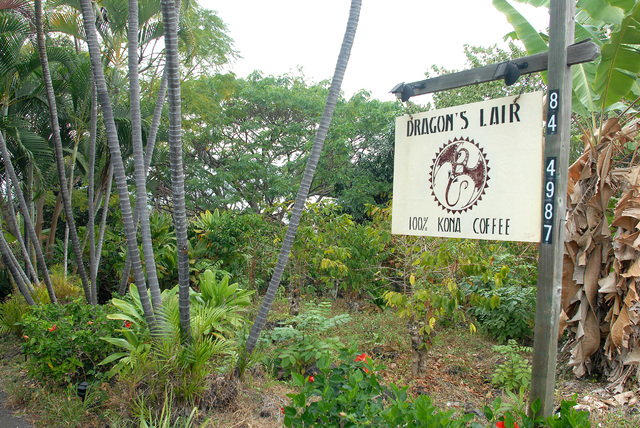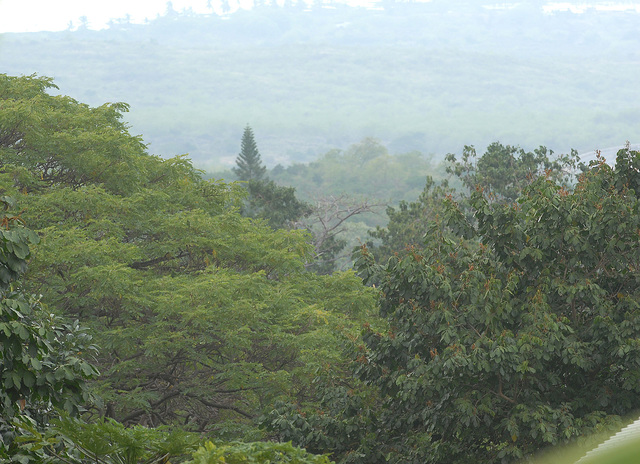A husband and wife who operated a South Kona coffee farm are suing Monsanto Co., alleging the agricultural biotechnology corporation purposely downplayed carcinogenic properties of glyphosate, the active ingredient in Roundup herbicide, and are responsible for the woman’s cancer.
The Miller Firm of Orange, Va., and Honolulu attorney Brian K. Mackintosh filed the civil suit Tuesday in U.S. District Court in Honolulu on behalf of Christine and Kenneth Sheppard, former owners of Dragon’s Lair Kona Coffee Farm in Honaunau.
The suit alleges Christine Sheppard, who once was president of the Kona Coffee Council, was diagnosed with non-Hodgkin lymphoma in 2003, after eight years of using Roundup on the farm, and that the Sheppards were forced to sell the farm and relocate to California in 2004, “where she continues to undergo treatment and surveillance for her lymphoma.”
The lawsuit seeks unspecified monetary damages, including compensatory damages, punitive damages and attorneys’ fees and court costs.
Attorney Michael Miller accused Monsanto of a “misinformation campaign” and said the Sheppards’ lawsuit will “force Monsanto to face the human consequences of their lies.”
“She’s been diagnosed with non-Hodgkin’s lymphoma, a very serious form of cancer that’s gone to Stage 4,” Miller said. “She’s had enormous treatment and now is in remission, but is in fear of it coming back. So, we’re seeking a fair amount of damages — her medical expenses, her pain, her suffering and her mental anguish. And we’ll ask a jury to put a number on that at an appropriate time.”
The suit comes a week after Monsanto filed a lawsuit in California seeking to prevent that state from adding glyphosate to its list of known carcinogens. The state’s Office of Environmental Health Hazard Assessment announced in September that it planned to add glyphosate to the list after the World Health Organization’s International Agency for Research on Cancer classified it as a probable human carcinogen last March.
Monsanto maintains Roundup is safe to use.
“While we are sympathetic to anyone suffering an illness, these claims regarding glyphosate are baseless and without merit, and we will defend against (the Sheppards’) suit vigorously,” Monsanto said in a statement Wednesday. “Glyphosate has a 40-year history of safe use, and based on the overwhelming weight of evidence, regulatory agencies around the world have concluded that glyphosate can be used safely according to label instructions. No regulatory agency in the world considers glyphosate to be a carcinogen.”
The suit claims Monsanto “knew or had reason to know that its Roundup products were defective and were inherently dangerous and unsafe when used in the manner instructed and provided by defendant.”
“Agricultural workers are, once again, victims of corporate greed,” the filing states. “Monsanto assured the public that Roundup was harmless. In order to prove this, Monsanto championed falsified data and attacked legitimate studies that revealed its dangers. Monsanto led a prolonged campaign of misinformation to convince government agencies, farmers and the general public that Roundup was safe.”
“I feel strongly about the fact that Monsanto should have told people that their herbicide is a cancer-causing agent and they haven’t warned people. It’s a shame,” Miller said. “Once the World Health Organization says you are probably a cancer-causing agent, you are a cancer-causing agent. That’s why California has implemented Proposition 65 (the Safe Drinking Water and Toxic Enforcement Act of 1986), to let everybody know (glyphosate) is a cancer-causing agent. We’ll be entering that case in California, as well, to stand up for California in the way they warn people.
“We think our chances are excellent, or we wouldn’t be involved.”
Miller said the Sheppards, who are originally from England, had a dream of owning a coffee farm and achieved it, but “the dream had to die.”
“They wanted to go organic with the coffee farm (and) had a five-year plan of doing that, but the farm had been using Roundup, so they continued to use Roundup. And she was diagnosed with non-Hodgkin’s. They tried to stay on the Big Island, but she needed more intensive medical care and ultimately sold the coffee farm.”
Email John Burnett at jburnett@hawaiitribune-herald.com.









